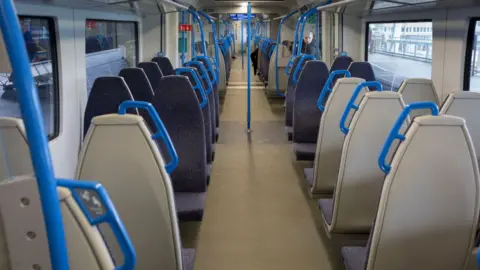'Sunday service' possible every day on railways
 Getty Images
Getty ImagesReductions to rail timetables could take effect in the coming days, as train firms deal with staff shortages caused by the coronavirus pandemic.
Services across Britain are now largely empty as most people work from home and avoid non-essential travel.
Contingency plans are being made by government, Network Rail and operators to ensure that vital journeys are still possible.
Certain train lines essential for emergency workers could be prioritised.
Freight could be given priority in places too.
The situation is so fast-moving that the detail of these plans is being worked-out day-to-day.
One option is to introduce something similar to a normal Sunday service on every day of the week.
Ghost trains
On Tuesday, the Transport Secretary Grant Shapps told MPs that services would be reduced in the short-term "to ensure we don't effectively run ghost trains."
The most pressing problem for train companies and Network Rail is staff shortages, as train drivers or signal-operators self-isolate or call-in sick.
One of the biggest franchises in the country, South Western Railway, had to cancel services this morning.
Other companies are also short of train crews as the virus spreads.
Refunds?
The rules over refunds for train tickets are changing amid the crisis.
Southeastern has already offered customers their money back on advance tickets. State-run LNER is offering passengers credit instead.
Passenger group Transport Focus called on other operators to follow suit.
People with season tickets, which they are no longer using because they are working from home or self-isolating, might qualify for a refund.
Transport Focus chief executive Anthony Smith said "people shouldn't be expected to carry on paying to get to work if they are being advised to stay at home."
The advice from the industry is to check with your rail company.
Big government bill
The immediate drop in passengers numbers and revenue for train companies is also causing unsustainable financial pressure.
So crisis talks between the Department for Transport and individual private train operators are ongoing.
Rail franchise contracts are likely to be suspended, and the government will have to increase the subsidies it pays to ensure that a reduced number of trains can still run.
The annual cost of running all train services in Britain is around £11bn.
If the government covers the vast bulk of that over a matter of weeks the bill would be hundreds of millions of pounds.
Nationalisation option
It is also possible that some rail franchises could be nationalised, if the talks between individual train companies and the government fail to reach a position which is commercially acceptable to both sides.
Although one rail boss insisted that the mood of the talks was "really collaborative."
"The railway wants to play its part in a time of need", he said.
Several train franchises were already in financial trouble before the coronavirus outbreak.
Negotiations concerning the UK's more troubled franchises are likely to be most complicated.
Two franchises, Northern and LNER, are already run by the Government.
European service
The Eurostar between the UK and France is operating a "minimal service". UK government advice against all but essential travel abroad has had an impact on the service.
Eurostar is a UK-based company but its main shareholder is the French state railway, SNCF.
The firm said it was working closely with the UK and French governments in "a very challenging time for the whole travel industry."
France is under a strict lockdown, with citizens who leave home having to carry a document detailing the reasons why.